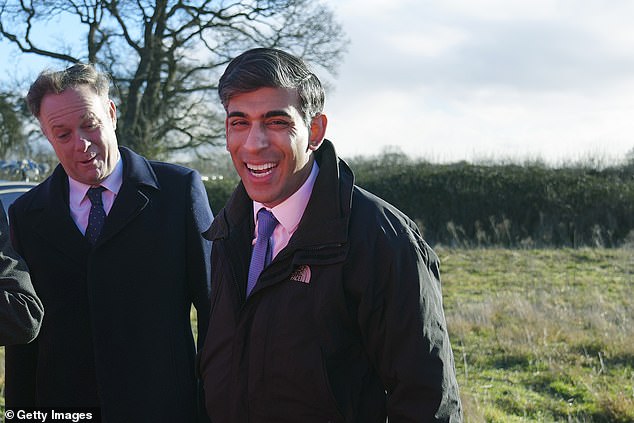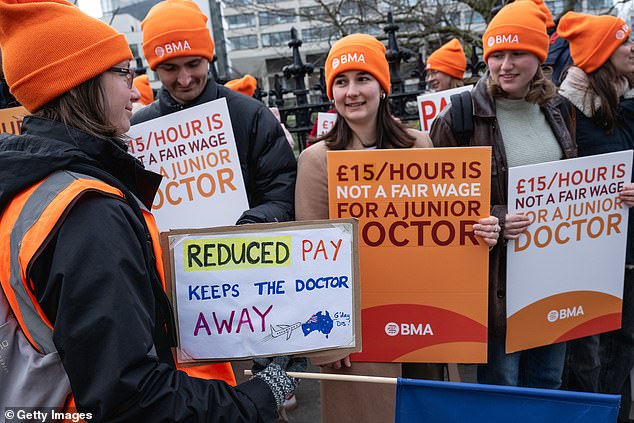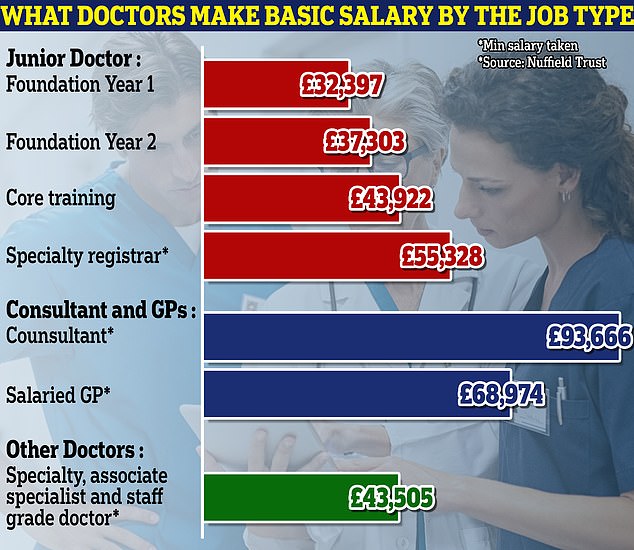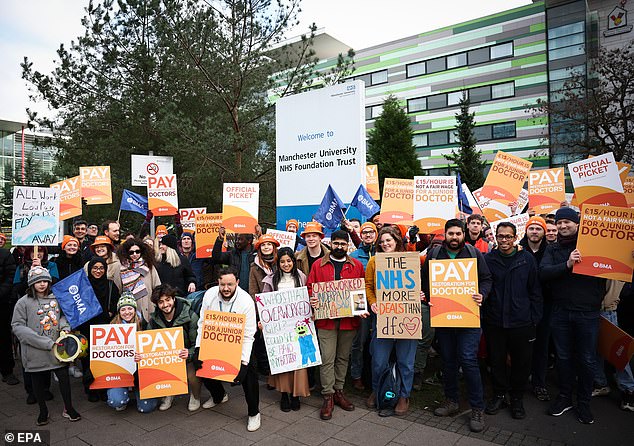Rishi Sunak today admitted the situation affecting NHS hospitals is not “where we want to be”, and insisted the plan is working.
The Prime Minister called for more time to improve the fortunes of the ailing health service, saying: “I know things will get better.”
It comes as junior doctors demanding pay rises worth up to £20,000 have again paralyzed the beleaguered health service.
It is the tenth time since March that junior doctors have walked out as the bitter pay dispute with the government shows no signs of slowing down.
The “militant” leader of the British Medical Association (BMA) young doctors group said the Government is “very happy that the strikes are happening”.

Questioned about the endless wave of action that has forced hospitals to cancel more than a million appointments and operations, Sunak told BBC Radio York: “I come from an NHS family, of course I don’t want to look down on it.” Pictured on a visit to Haxby in Yorkshire


Today’s ongoing strike marks the 10th time since March that junior doctors have walked out as the bitter pay dispute with the government shows no signs of slowing down. Pictured are doctors on the picket line outside St Thomas’ Hospital in Westminster.
Questioned about the endless wave of action that has forced hospitals to cancel more than a million appointments and operations, Sunak told BBC Radio York: “Are we where we want to be? Not yet.
‘We are making progress? Yes, the plan is working. If we continue like this, I know things will get better.”
Sunak added: “I come from an NHS family, of course I don’t want to look down on it.”
‘We are investing a record amount, more funding, so it has never been higher: more doctors, more nurses and we are making improvements.
‘Now, look, that’s not going to happen overnight.
‘But if you look at the performance of ambulances and emergency departments this winter, it is better than last winter. So that’s progress.
‘As far as waiting lists are concerned, in recent months we have seen that waiting lists have started to decrease.
‘And that’s because we haven’t had as many industrial actions.
“Obviously there is a strike again, but at the end of last year we didn’t have any strikes in October or November and the waiting list was reduced by approximately 150,000.”
By the end of the latest strikes at 11:59 p.m. on Wednesday, hospital doctors will have had 44 days or 1,056 hours of strike action, which is equivalent to around 12 percent of the year.
More than 1.3 million appointments have been cancelled, 7.6 million are waiting to begin treatment, and millions more are facing long waits to continue care.
Emergency services remain open on strike days and officials have told Britons who need urgent medical attention to continue seeking help as normal.
Speaking from a picket line at St Thomas’ Hospital in Westminster, Dr Rob Laurenson, co-chair of the BMA’s junior doctors committee, said: “I don’t think the Government wants to end this dispute.
Your browser does not support iframes.
Your browser does not support iframes.
‘I think they are very happy that the strikes are happening. And I think they are failing everyone.
‘I find it difficult to understand whether this is incompetence or malice. Either way, it fails everyone.”
Dr Laurenson added: ‘This round of action is because in December Victoria Atkins (Health Secretary) said she would be back at the table in 20 minutes with another offer to make. But those 20 minutes turned into 20 days.
“Then he sent a junior minister who said they had no more offers up their sleeve, so the government lied.”
Young doctors are calling for salaries to be restored, saying they have faced real terms pay cuts of more than a quarter since 2008. This equates to around 35 per cent.
“We have gone above and beyond on every occasion in terms of our goodwill, to ensure we can run a service, but the Government pays it forward with pay cuts,” Dr Laurenson said.


Young doctors in their first year now have a basic salary of £32,300, while those with three years’ experience earn £43,900. The oldest wins £63,100


The latest strike began at 7am on Saturday and the junior doctors returned to work at 11.59pm on Wednesday. Young doctors outside Manchester Royal Infirmary this morning


Ministers have given junior doctors a pay rise of 8.8 per cent, on average, for the 2023/24 financial year. However, the increase was largest for first-year doctors, who were given a 10.3 percent raise. Pictured is a black cocker spaniel wearing a BMA hat on the picket line outside St Thomas’ Hospital.
‘We are seeing the absolute collapse of goodwill. It has long been said that the NHS runs on goodwill, and now that we have seen that collapse, I think we are also seeing the result of the collapse of the NHS.’
The latest strike began at 7am on Saturday and the junior doctors returned to work at 11.59pm on Wednesday.
Ministers have given junior doctors a pay rise of 8.8 per cent, on average, for the 2023/24 financial year.
However, the increase was largest for first-year doctors, who were given a 10.3 percent raise.
In December, Health Secretary Victoria Atkins offered them a further 3 per cent rise in a bid to prevent further strikes.
But the union said the enhanced sum was still “completely insufficient”.
Young doctors in their first year now have a basic salary of £32,300, while those with three years’ experience earn £43,900. The oldest earn £63,100.

